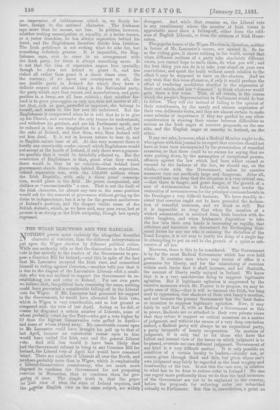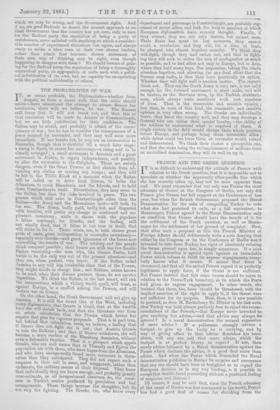THE WIGAN ELECTIONS AND THE RADICALS.
NOTHING proves more curiously the altogether deceitful character of statistics, than the different interpretations put upon the Wigan election by different political critics. While one authority tells us that the diminution in the Liberal vote is due entirely to the resolve of the Government to pro- pose a Coercion Bill for Ireland,—and this in spite of the fact that Mr. Lancaster accepted the Irish view, and committed himself to voting against Coercion,—another tells you that it is due to the disgust of the Lancashire Liberals with a candi- date who was not inclined to support the Government in re- establishing law and order in Ireland. For our own parts wo believe that, the political facts remaining the same, nothing could have prevented a considerable falling-off in the Liberal vote for Wigan. If Mr. Lancaster had promised his support to the Government, he would have alienated the Irish vote, which in Wigan is very considerable, and so lost ground as compared with the vote of last April. Acting as he did, of course he disgusted a certain number of Liberals, some of whom probably voted for the Tory—who got a vote higher by 59 than the highest Conservative vote polled in April— and some of whom stayed away. No conceivable course open to Mr. Lancaster could have brought his poll up to that of last April, because no conceivable course open to him Would have united the Irish vote and the general Liberal vote. And still less would it have been likely that lead the Government refused to bring in any Coercion Bill for Ireland, the Liberal vote of April last would have remained intact. There are numbers of Liberals all over the North, and .nowlseme probably more than in Wigan, which is emphatically a Liberal-Conservative constituency, who are much more disposed to condemn the Government for not proposing coercion in November, than to condemn them for pro- peeing it now. The simple truth is, that the popu- lar view of what the state of Ireland requires, and the p0trlarEnglish view on the same subject, are widely
divergent. And while that remains so, the Liberal vote in any constituency where the number of Irish voters is appreciable must show a falling-off, either from the cold- ness of English Liberals, or from the coldness of Irish Home- rulers.
The popular lesson of the Wigan Election is, therefore, neither in favour of Mr. Lancaster's course, nor against it. So far as the voting goes, it shows nothing in the world, except that when different sections of a party take absolutely different views, you cannot hope to unite them, do what you will ; and the best thing you can do is to take your stand on your own convictions, and speak the truth without much relation to the effect it may be supposed to have on the electors. And we only wish that this were oftener so, if only it would produce the effect of rendering candidates sturdier in the expression of their real minds, and less " disposed " to think whatever would gain them a few votes. That, at all events, is the course which the people's Representatives in Parliament would do best to follow. They will rise instead of falling in the opinion of their constituents, by the manly and sincere expression of their own deliberate views, and they are almost certain to make some mistake of importance if they are guided by any other consideration in steering their course between difficulties so serious as the Irish anger at coercive proposals, on the one side, and the English anger at anarchy in Ireland, on the other.
If any one asks, however, what a Radical Member ought to do, who agrees with this journal in its regret that coercion should not have at least been accompanied by the presentation of remedial measures, so that there could be no excuse for saying that we wore putting down, by the assumption of exceptional powers, offences against the law which had been either caused or excused by tho badness of the law, we should say, on the whole,—vote with the Government, unless its coercive measures turn out needlessly large and dangerous. After all, no candid man can deny that the situation is a very critical one, —that there is danger, and great danger, of the growth of a sort of Antinomianism in Ireland, which may render the restoration of reverence even for the principal commandments in the Decalogue a very difficult business. We have steadily in- sisted that coercion ought not to have preceded the declara- tion of remedial measures, and we think so still. But it is impossible to deny that when the mention of a wicked assassination is received from Irish benches with de- risive laughter, and when Irishmen's disposition to take the law into their own hands is increasing so rapidly, that solicitors and barristers are threatened for discharging their _usual duties for any one who is resisting the dictation of the Land League, it is not easy to justify the delay of a single day in attempting to put an end to the growth of a spirit so sub- versive of all law.
Moreover, there is this to be considered. The Government is by far the most Radical Government which has ever held power. It contains men whose very tenure of office is a guarantee for liberty, and for the minimising of coercion within such limits that it shall increase, and not diminish, the amount of liberty really enjoyed in Ireland. We know that it is a very mischievous thing to suppress legitimate agitation. But if legitimate agitation is suppressed by the coercive measures which Mr. Forster is to propose, we may be quite sure of this,—that it will be because the Irish, too long used to oppression, fear shadows of their own fancy's creation, and not because the present Government has the least desire or intention to suppress legitimate agitation. Now, it may fairly bo said that if, with so Radical a Government as this in power, Radicals are so attached to their own private views that they refuse it support on critical occasions on a matter of judgment, and without the excuse of a very deep conviction indeed, a Radical party will always be an unpractical party, a party incapable of hearty co-operation. On matters of judgment, it is only fair to let those who have the fullest and nearest view of the issues on which judgment is to be passed, overrule our own different judgment. Government of any kind is a very difficult matter. It is only possible on condition of a certain loyalty to leaders,—loyalty not, of course, given through thick and thin, but given whore one's own judgment may fairly be regarded as the least weighty and trustworthy of the two. Is not this the case now, in relation to what has to be done to restore order in Ireland ? No one
can regret more profoundly than we do that the land measures of the Government are not to be explained to the country, before the proposals for enforcing order are submitted actually to Parliament. But this is, nevertheless? a point on which we may be wrong, and the Government right. And if so, are good Radicals to desert the nearest approach to an ideal Government that the country has yet seen, only to earn for the Radical party the reputation of being a party of crotcheteers, never satisfied with anything on which a consider- able number of experienced statesman can agree, and always ready to strike a blow even at their own chosen leaders, rather than admit that fourteen chosen statesmen of their own way of thinking may be right, even though happening to disagree with them ? We should beware of gain- ing for the Radical party the reputation of being a thoroughly unpractical party, an aggregation of units each with a politi- cal individuality of its own, but no capacity for co-operating with the political individuality of others.



































 Previous page
Previous page